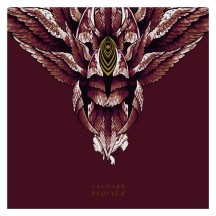Laudare - Requiem review
| Band: | Laudare |
| Album: | Requiem |
| Style: | Chamber, Post-hardcore, Avantgarde metal, Progressive metal |
| Release date: | October 11, 2024 |
| A review by: | musclassia |
01. Introitus
02. Dies Irae
03. Quid Sum Miser
04. Rex Tremendae
05. Quaerens Me
06. Lacrimosa
07. Offertorium
08. Hostias
09. Sanctus
10. Agnus Dei
At a rate of one new discovery per year, I’m not quite encountering enough in the way of chamber music/metal fusions to proclaim the emergence of a nascent scene, but given the success rate of the albums I’ve encountered thus far, maybe more bands should be hopping on the trend.
Ode And Elegy’s self-titled carrying of The Pax Cecilia’s torch was one of the most fascinating debut albums of 2022, a near-hour single-song odyssey that brought together string quartets, mournful choirs, and post-hardcore and doom elements within a hugely ambitious post-metal framework. Only a year later, Anareta made their own debut with Fear Not, which also incorporated chamber strings and choral vocals within heavy songs influenced by screamo and doom. Requiem is not the debut album from German quartet Laudare, but it does bear similarities elsewhere to the aforementioned groups.
For those unfamiliar with the term ‘chamber music’, in brief it’s a term for classical music performed by small groups; string quartets and chamber choirs are examples that most naturally come to mind, and stringed instruments and choral vocals are both central components to Requiem. On some tracks (namely “Lacrimosa”, “Sanctus” and “Agnus Dei”), the choral arrangements are performed by the Unichor Leipzig, but the band’s own vocalists are fully capable of their own harmonizing (when they’re not unleashing fierce harsh vocals), as demonstrated at the beginning of opening track “Introitus”. One of those vocalists, Almut, also performs cello, which works synergistically with the rock/metal instrumentation across the album.
Cello in metal will naturally take many people’s minds to SubRosa, but unlike the other two groups I mentioned early in the review, doom metal isn’t massively prominent in Laudare’s sound (the songs here are comparatively concise, none exceeding 6 minutes); instead, there’s a progressive rock/metal slant to some of the compositions, particularly when considering the rhythmic complexity of certain songs, and also post-rock and post-metal are represented in the dynamics of some passages, as well as with the odd atmospheric tremolo. One common style between Laudare, Anareta and Ode And Elegy is post-hardcore/screamo; the harsh vocals on the album are raw and anguished screams, and on top of that there’s the instrumentation of tracks such as “Quaerrens Me”.
Some songs lean more towards either the metallic intensity or the sombre chamber sounds, but most manage to bring together portions of both. After a lengthy vocal/piano opening, “Introitus” eventually advances into brooding post-metallic heft. “Dies Irae”, in contrast, waits little time before unleashing the first of several blast beat assaults across the album, but allows the cello to meander through both the blasting passages and the cleaner moments after. “Dies Irae” is a dramatic, passionate song with a wide range of fluctuating dynamics; “Offertorium” is similarly broad and ambitious, and similarly shines with some lovely cello parts dwelling alongside exhilarating riffs.
For songs with a bit more of a metallic emphasis, one can look at “Quid Sum Miser”, which opens with a portentous riff that immediately captures one’s attention, or towards the at-times rampant “Sanctus”, during the climax of which angelic choirs soar above pained shrieks and pounding, blasting drumming. At the other end of the spectrum, the piano/classical guitar/vocal trio piece “Hostias” is the only track to eschew any rock or metal; “Rex Tremendae” largely goes the same route (swapping the piano for cello), but ultimately builds to a bleak, haunting march in the closing stage, as reverberating drums and impassioned evocations build an entrancing atmosphere. “Lacrimosa” is maybe the song on which the aforementioned Unichor has the most chance to shine, both when the mesmerizing sopranos are given centre stage, and then later when they accompany heavier sounds, whether it be blackened tremolo textures or more playful, neoclassical moments.
For anyone who is intrigued by the style fusion on display here and who hasn’t tried out either of the bands I’ve mentioned earlier, I suspect Requiem would make for a more approachable and immediately rewarding entry point; the production is much better than that of Anareta’s debut, with more compelling songwriting to boot, and the shorter, more direct songs will be easier to engage with than the mournful expanse of Ode And Elegy. At the very least, Requiem has caught my attention immediately and left me hungry for more; it will be fascinating to see whether more groups start following in the footsteps of these bands to sate that appetite.
Rating breakdown
| Performance: | 8 |
| Songwriting: | 8 |
| Originality: | 9 |
| Production: | 8 |
Comments
Comments: 7
Visited by: 82 users
| RaduP CertifiedHipster Staff |
| musclassia Staff |
| corrupt With a lowercase c Admin |
| nikarg Staff |
| RaduP CertifiedHipster Staff |
| Alex F |
| Ivor Staff |
Hits total: 1152 | This month: 55






